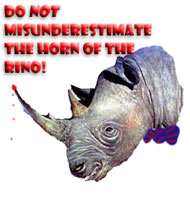October 12, 2004
This seems about right
The latest take from the indefatigable Larry Sabato:
Posted by Steve at October 12, 2004 12:03 PM | TrackBack1. The first debate cost Bush almost his entire lead, and the most reliable national surveys now show Bush and Kerry statistically tied. They have one or the other candidate ahead by a point or two or three, but within the all-important margin of error.2. Luckily for Bush, Dick Cheney was narrowly judged the winner of the October 5 vice presidential debate--both by the instant ABC News poll and by elite opinion. While vice presidential debates have almost no influence on the final vote, and one can reasonably dispute whether the relatively unpopular Cheney truly helps Bush more than the relatively popular John Edwards aids Kerry, Cheney did arrest the Bush ticket's free fall in the polls.
3. Bush followed up Cheney's good showing with an enormously improved performance on October 8 in the second presidential debate. The President was direct, personable, issue-oriented, and, well, presidential; he took command in a way he utterly failed to do in the first debate. However, Kerry also did well, and the Crystal Ball agrees with the "tie" ratings assigned by the instant polls and elite opinion. As an aside, we also agree with the critics who have pointed out a dozen or more missed opportunities for both candidates in this debate to counter-punch a near knock-out. But try getting up in front of 60 million Americans--with the presidency hanging in the balance--and make no mistakes. Even Ken Jennings would have choked!
4. The final debate this Wednesday, October 13th, is critical, too. Both Bush and Kerry need at least a tie, and for the same reason: the momentum coming out of this final encounter may well carry through to election day, and neither can afford to slide backwards.
5. We disagree that the fourth debate automatically favors John Kerry because its subject matter is domestic policy. First, Bush would never have won the White House in the first place had he not had adequate, even popular, answers on the key domestic policy questions. Second, viewers are judging style as much as substance, as we learned anew in the first debate. We have become a nation of drama critics, shrugging at factual errors and overly lavish promises--being surprised by neither--and often putting greater emphasis on the quality of tans, ties, tailoring, and make-up than on argument.
6. There is no current favorite in this contest. Bush has relinquished the title, but Kerry has not yet grabbed it. Maybe the final debate will decide this, or maybe the final breaking of the undecideds/leaners disproportionately toward one candidate will tell the tale, or maybe some unknown development at home or abroad will do it. The latter category intrigues our readers the most, and we have received missives full of wild and wooly scenarios--from the capture of Osama (no, dear friends, he is not under "cave arrest" waiting to be brought out into the warm lights of television at the last moment, for that would require an impossibility: the successful keeping of a secret for weeks or months by hundreds in the military and government), to a terrorist plot domestically, to a last-minute "scandal" akin to the DUI revelation that likely cost Bush the popular vote in early November of 2000. (With the DUI lesson in mind, whatever have the parties saved up for a climactic finish this year? We fear to ask, and fear even more to know...)
7. We continue to believe that President Bush absolutely, positively MUST have at least a 51 percent approval rating in the nation as a whole to be reelected. Second, given our surmise that the undecideds/leaners will break somewhat more heavily for Kerry, we think Bush needs to have built a lead of at least several points overall to win narrowly. In other words, a polling tie probably results in Kerry's election.
8. Another reason for concern in the Bush ranks ought to be the likelihood of an enormous turnout (by American standards)--somewhere between 55 and 60 percent of eligible adults. The Crystal Ball suspects that the larger the turnout, the more likely there will be at least a slight Democratic tilt to the additional increment of participants. In our travels this election season, we've seen both anecdotal evidence and some statistical proof in the party identification of new registrants that supports our suspicion. We are tempted to argue that Bush actually needed his full 5 to 6 percent September lead to insure a narrow victory.
9. While the contest for the White House gives every indication of closeness, we remind our readers that one needs to reach back to the 1870s and 1880s to find two consecutive, tight presidential elections. That doesn't mean a couple of squeakers can't occur in a row again, just that it would be a rare event--and as unlikely as it appears today, it is possible that either Kerry or Bush may break into a clear lead by election day.
10. The changes at the top of the ballot are having some effect on congressional races below. Given the miserably low number of competitive House elections, it will take a runaway victory to shift control from the Republicans to the Democrats. But the Senate is something else again. George Bush's margin of victory really matters in Alaska, Colorado, Florida, Louisiana, North Carolina, Oklahoma, and South Dakota--all places where GOP Senate nominees are in close contests. An extra few percentage points for Bush in these states MIGHT make the narrow difference between victory and defeat for the Republican aspirants. Right now, as our separate analysis shows, the Senate is slightly leaning GOP, but is looking tight. A Kerry victory of decent size could give the Democrats the upper chamber of Congress--and greatly strengthen Kerry's hand as President.
2004 has been a difficult year for the country, but at least the presidential election has not disappointed. It's a barnburner. No doubt our analysis will change in some respects as we count down the remaining weeks with you. Whether you are a Bush backer or a Kerry fan or something else, you can be fascinated--as we are--by the struggle of the American electorate to reach closure on the somewhat unsatisfying choice facing the swing voters. The Crystal Ball is smooth, but it can also be blunt: A small majority of voters appears to want to replace George Bush in the White House, judging him to be too conservative, too stubborn, and too eager to get the nation involved in dangerous foreign conflicts. At the same time, a small though different majority of voters seems resistant to selecting John Kerry, regarding him as too lacking in leadership (the "flip-flop" image), too liberal, and too unlikable personally. Yet finality is essential, and the time draws nigh. Keep an eye on your Crystal Ball, as we peer for you--as best we can see--into this most critical of all political choices, unfolding before us all.
Steve-O: IMHO, if the candiates are evenly matched in the polls going into the election, such a tie benefits Bush. The Republican base is united and revved up to support Bush. Kerry has difficulty securing his base as shown by the stories recently showing older women, particularly married women, are leaning Republican as are increasing numbers of minorities. A shift of only a few points among women and African-Americans will tip the election decisively to Bush. Undecided voters will not determine the outcome--people who have not made up their minds by this point are going to stay home.
Posted by: LMC at October 12, 2004 02:04 PM



